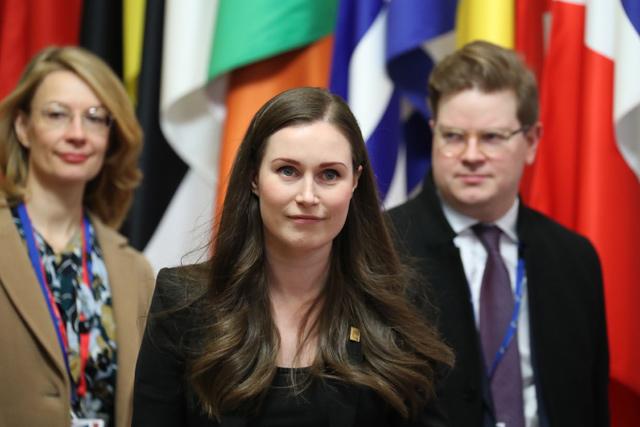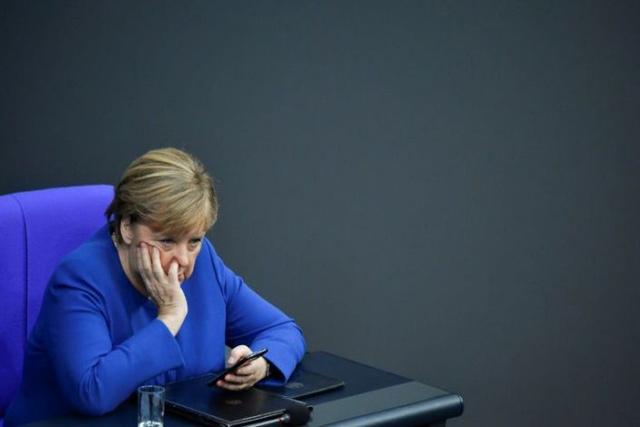You are here
EU virus recovery summit struggles to find accord
By AFP - Jul 19,2020 - Last updated at Jul 19,2020
BRUSSELS — An EU summit to agree a huge coronavirus economic rescue package was at risk of collapse without a deal on Sunday as bickering leaders struggled to find compromises on a third day of talks.
The 27 leaders have argued for more than two days over the scale and rules for the package, with The Netherlands leading a band of "frugal" allies in demanding lower budgets and tougher conditions for handouts.
At the start of what she said was probably the "decisive" third day of the extraordinary summit, German Chancellor Angela Merkel said there were still many divisions among the leaders.
"I still can't say whether a solution will be found," she said. "There is a lot of good will ... but it may also be that no result will be achieved today."
The veteran German leader joined French President Emmanuel Macron and the summit host, European Council President Charles Michel, to prepare a new offer to break the logjam after Dutch Prime Minister Mark Rutte and his "Frugal Five" allies blocked his plan for a deal.
The Dutch want member states to have a say over national bailouts to ensure countries carry out labour market reforms, while Austria, Finland, Denmark and Sweden want to see the up to 750-billion-euro package of loans and subsidies cut down.
The "frugals" have resisted the pleas of Germany and France, traditionally the bloc's most powerful members, to agree a plan to help the countries hardest hit by the pandemic — most notably Spain and Italy.
As the increasingly testy talks wore on, another stumbling block emerged — what officials call the "Rule of Law" issue, in which some states want to tie recovery funds to governments upholding EU legal standards.
Hungary's Prime Minister Viktor Orban — backed by Poland and now Slovenia — are dead against such conditions, making the unanimity needed for a deal even harder to achieve.
Unprecedented crisis
Macron urged leaders to "take responsibility" as Europe grapples with a severe recession caused by the virus and its lockdowns, saying a deal could still be found.
"But these compromises cannot be made at the cost of European ambition," he warned.
"Not out of principle but because we are facing an unprecedented health, economic and social crisis, because our countries need it and European unity needs it."
After his officials worked through the night, Michel came up with a new proposal, and a diplomatic source indicated that a compromise might be found by cutting grants in the scheme from an initial suggestion of 500 billion euros down to 400 billion euros ($460 billion).
But a Spanish diplomatic source said that the two sides were so far apart that they were not even discussing details.
The full round-table gathering of all 27 leaders, supposed to begin at noon (10:00 GMT), was pushed back to at least 4.00pm to give time for small group meetings in search of compromises.
"At this stage it's not about weighing up one proposal or another but working out whether it's realistically possible to reach a deal," the Spanish source said.
Highlighting the febrile atmosphere, Italian Prime Minister Giuseppe Conte sent a tweet bluntly spelling out what he saw as the weight of numbers against Rutte and his allies.
"On the one hand, the overwhelming majority of countries — including the largest Germany, France, Spain, Italy — defending the European institutions and the European project, and on the other, a few so-called 'frugal' countries," Conte wrote.
Later Conte and some of the other southern leaders sat down face-to-face with the frugals.
Super brake
The Netherlands and its allies refused earlier versions of Michel's plan because they gave away too much cash as grants, instead of lending it as loans.
In a concession to Rutte's doubts about the plan's governance, Michel proposed a "super emergency brake" that gives any country a three-day window to trigger a review by all member states of another's spending plans.
Underlying Dutch concerns is the reputation of Spain and Italy for lax public spending in the minds of voters in northern Europe, and Rutte wants them to reform their labour and pensions rules.
To further entice the "frugals", Michel has promised to hike the rebates they get on their EU contributions.
Austria welcomed this but said it did not go far enough.
And the rescue package is in addition to the planned seven-year EU budget — worth more than one trillion euros — that the leaders must also discuss.
Here, countries will defend traditional targets of EU spending, such as farming to France and development projects in eastern Europe, that others would like to see go to fighting climate change or technology.
Related Articles
BRUSSELS — An EU summit called to set the bloc’s next seven-year budget ended in impasse late Friday, riven by competing groups among the 27
BRUSSELS — EU leaders gathered on Thursday for a stormy summit to decide the bloc’s seven-year budget, with bitter divisions between parsimo
THE HAGUE — Dutch Prime Minister Mark Rutte set a new record for time in the saddle on Tuesday, becoming The Netherlands' longest-serving le













